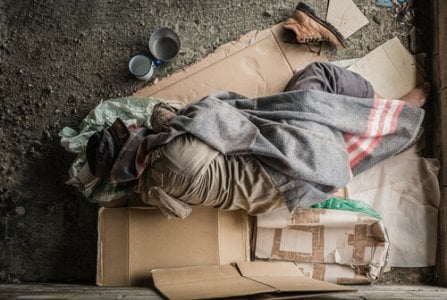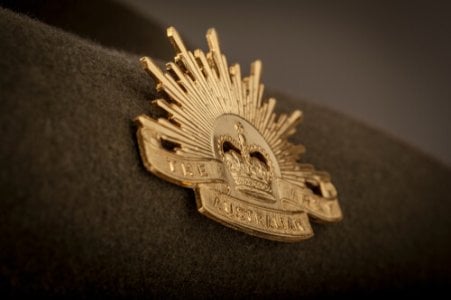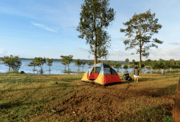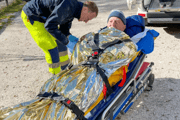Australian veterans forced to sleep on creek beds amid rising homelessness crisis
- Replies 13
It’s no secret that veterans often face unique challenges once they’ve returned to everyday civilian life.
Dave Hughes is just one of the 300 veterans who leave the Australian Defence Force (ADF) each year and then find themselves homeless. After being discharged, he spent nearly a year sleeping on creek beds and surfing from couch to couch. For many ex-service members, transitioning back into civilian life can be their biggest obstacle and leaders are now calling for more to be done to help them make the shift.
'If the veteran can't get work, it can lead to financial difficulties; this can affect the household and result in relationship problems,' Vasey RSL Care Executive General Manager Chris Gray told Weekend Today.
'If the family breaks up, the veteran can find themselves staying on a mate’s couch or even sleeping in their car. Ultimately, this situation can bring out latent mental health issues, or lead to problem drinking, gambling and so on.'
While Dave was able to turn his life around. Now he and his close friend, Vietnam War Veteran Alan Murphy, are doing everything they can to help other veterans who find themselves in similar dire straits.
'I started surfing couches, staying at friends' places, and family. I ended up sleeping on creek beds for nearly a year,' said Hughes.
Alan now lives in assisted housing among dozens of other former veterans and can relate to the problems that these men and women are facing.
'The next day I was a civilian. All I had was a paper saying discharge certificate. And that was it. I see these young guys come off the street and I just see how hard and what they've been through.'
Putting up your hand and seeking assistance can be another difficult obstacle to overcome for many. Keith Walsh spent nearly five years homeless and sleeping in his car until a Vasey RSL charity program eventually stepped in to help.
'You've gone from having support, unlimited support. To having to fend for yourself,' he said.
There is clearly a need for more of these programs and services.
'I think there are lots of different support, but we are talking about more than a roof over their head,' said Chief Executive Janna Voloshin.
'We are going to put the roof over their head, get them off the street, and then assist them with everything they need to get to a stage where they can live independently.'
Veterans who are in need of assistance to help make the transition back to civilian life or require emergency housing should reach out to:

You might also like to read about the recently announced Veterans Chaplaincy Pilot Program.
'There is no doubt that the transition from service requires a massive readjustment for veterans and their families. The Albanese Government is working to enhance the support available through transition, and the support provided by ADF Chaplains will provide familiar comfort for many,' said Minister for Veterans' Affairs, Matt Keogh. You can read more about this development here.
Members, we would love to hear from you. The veteran homelessness rate is concerning news. If you know anyone in need, please direct them to the resources listed in this article.
Dave Hughes is just one of the 300 veterans who leave the Australian Defence Force (ADF) each year and then find themselves homeless. After being discharged, he spent nearly a year sleeping on creek beds and surfing from couch to couch. For many ex-service members, transitioning back into civilian life can be their biggest obstacle and leaders are now calling for more to be done to help them make the shift.
'If the veteran can't get work, it can lead to financial difficulties; this can affect the household and result in relationship problems,' Vasey RSL Care Executive General Manager Chris Gray told Weekend Today.
'If the family breaks up, the veteran can find themselves staying on a mate’s couch or even sleeping in their car. Ultimately, this situation can bring out latent mental health issues, or lead to problem drinking, gambling and so on.'
While Dave was able to turn his life around. Now he and his close friend, Vietnam War Veteran Alan Murphy, are doing everything they can to help other veterans who find themselves in similar dire straits.
'I started surfing couches, staying at friends' places, and family. I ended up sleeping on creek beds for nearly a year,' said Hughes.
Alan now lives in assisted housing among dozens of other former veterans and can relate to the problems that these men and women are facing.
'The next day I was a civilian. All I had was a paper saying discharge certificate. And that was it. I see these young guys come off the street and I just see how hard and what they've been through.'
Putting up your hand and seeking assistance can be another difficult obstacle to overcome for many. Keith Walsh spent nearly five years homeless and sleeping in his car until a Vasey RSL charity program eventually stepped in to help.
'You've gone from having support, unlimited support. To having to fend for yourself,' he said.
There is clearly a need for more of these programs and services.
'I think there are lots of different support, but we are talking about more than a roof over their head,' said Chief Executive Janna Voloshin.
'We are going to put the roof over their head, get them off the street, and then assist them with everything they need to get to a stage where they can live independently.'
Veterans who are in need of assistance to help make the transition back to civilian life or require emergency housing should reach out to:
- The Defence All-Hours Support Line on 1800 628 036
- The All-hours Support Line (ASL) is a confidential telephone service for ADF members and their families that is available 24 hours a day, seven days a week. The ASL is designed as a triage line, which simply means that it is there to help you access ADF or civilian mental health services more easily. Services that you can access include psychology, medical, social work, and chaplain services.
- The Defence Member and Family Helpline on 1800 624 608
- The Helpline call centre is available 24/7 and is staffed by qualified human services professionals including social workers and psychologists.
- Open Arms - Veterans & Families Counselling on 1800 011 046
- Open Arms can provide individual, couple and family counselling to help improve your resilience, as well as enhance your mental health and well-being.
Key Takeaways
- Veteran homelessness is rising across Australia, with around 300 veterans experiencing homelessness each year after leaving the Australian Defence Force (ADF).
- Transitioning back into civilian life can be challenging, leading to financial difficulties, relationship problems, and mental health issues.
- Vasey RSL, a leading provider in ex-service housing, offers critical support for veterans not only in need of housing but also in returning to civilian life.
You might also like to read about the recently announced Veterans Chaplaincy Pilot Program.
'There is no doubt that the transition from service requires a massive readjustment for veterans and their families. The Albanese Government is working to enhance the support available through transition, and the support provided by ADF Chaplains will provide familiar comfort for many,' said Minister for Veterans' Affairs, Matt Keogh. You can read more about this development here.
Members, we would love to hear from you. The veteran homelessness rate is concerning news. If you know anyone in need, please direct them to the resources listed in this article.









